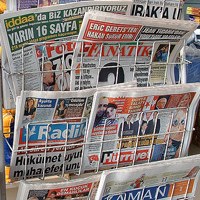![]()
Wed, Jan 26, 2011 | Prime Minister’s Office

Israeli Prime Minister Benjamin Netanyahu in Knesset in Jerusalem in ceremony marking Holocaust Remembrance Day. (EPA/KOBI GIDEON)
Netanyahu: Have the lessons of the Holocaust been learned?
PM Netanyahu’s address to the Knesset marking the International Holocaust Remembrance Day.
International Holocaust Remembrance Day, January 27, is the first universal memorial day for the victims of the Holocaust during the Nazi era which resulted in the annihilation of 6 million European Jews and millions of others by the Nazi regime. It marks the anniversary of the liberation of Auschwitz-Birkenau, the largest Nazi death camp. In 2005 [1 November], the United Nations General Assembly Resolution 60/7 designated this day as International Holocaust Remembrance Day (IHRD) during the 42nd plenary session. Every member nation of the U.N. has an obligation to honor the memory of Holocaust victims and develop educational programs as part of an international resolve to help prevent future acts of genocide. The U.N. resolution rejects denial of the Holocaust, and condemns discrimination and violence based on religion or ethnicity.
Israeli Prime Minister Benyamin Netanyahu’s address to the Knesset marking the International Holocaust Remembrance Day 2011 is translated here (official translation by the Prime Minister’s Office):
Have the lessons of the Holocaust been learned?
For us, the Jewish people, the answer is yes.
For the rest of the world, the answer is no.The lesson that we have learned is evident in our standing here, in our sovereign state, in our capital city.
The most crucial lesson we learned from the Holocaust is that we needed to restore our people to our own state, with an army and the capacity for self-defense.
This lesson was understood by Herzl even before the great atrocity, which he foresaw, took place. And we implemented it.
But there is another lesson. At the end of the Holocaust, there were 11 million Jews left in the world. Before it, there were 18 million. Even at a very slow rate of natural increase of the population, there should have been almost 30 million Jews in the world today, but in fact, there are only 13.5 million; millions fewer than expected. This deficit is not the result of physical loss, but of loss of identity and assimilation.
The only place where the Jewish people has enjoyed substantial, welcome growth is here, in the State of Israel. There is no nation that could live on a demographic pin head. Therefore, alongside cultivating our country, we must continue to bring Jewish people to Israel, as well as preventing their assimilation abroad. The projects that we operate – Birthright, MASA and Moreshet – are aimed at young Jewish adults in Israel and abroad, and this is an essential element in assuring our future.
But has the world learned the lesson? One fact is clear today: the renewal and expansion of global anti-Semitism. If anyone thought that anti-Semitism stopped after the Holocaust, it is now evident that it was only a hiatus. Various powers are joining forces and flooding the world with old/new anti-Semitism, which we must fight.
For that reason, I congratulate my friend Silvan Shalom who, when serving as Foreign Minister, introduced an important United Nations resolution – marking the International Holocaust Remembrance Day commemorating the victims.
This resolution is indeed implemented in many countries. But does the world that condemns the anti-Semitism from that era also condemn anti-Semitism today?
Every now and then there are those who do, very feebly. This isn’t simply anti-Semitism. The Ayatollah regime in Iran, a member country of the UN, openly calls for the annihilation of another six million Jews, without even a hint of pretense. And nobody says a thing. Well, that’s not exact. Here and there a comment might be heard, but where is the anger, the outrage? Where is the outcry? Where is the “J’accuse?”
This is a very disturbing historical phenomenon, because civilized people are allowing this affliction, this savagery, barbarism and primitivism to be uttered and spread.
I am aware that there are many leaders and good-hearted, conscientious people around the world who think as I do.
However, that will not suffice. Because in the face of this phenomenon, a regime that calls for our annihilation and arms itself with weapons of mass destruction in order to fulfill its nefarious intentions, there should be a much stronger protest.
This insufficient response brings back sad memories. I served in the UN as the Israeli representative. One day I heard rumors that Kurt Waldheim, who was President of Austria and Secretary-General of the United Nations, had a war-criminal file in a UN archive.
I learned that during World War II, the Allies established a commission at the instigation of Churchill that gathered material against Nazi criminals and their collaborators. This archive had been handed over to the UN. I asked if I could see it. I was told I could not as all member countries of the commission had to grant me consent, and there was no such approval. After a year’s effort, I succeeded in obtaining their agreement, and I entered the archive.
I opened the dossier on Waldheim and my hair stood on end. There were horrible things in there, hidden for decades. In the same box, I also saw files about Birkenau from 1944, testimony about exterminations, the death marches, trains, the S.S. – it was all documented. I think I also saw files that referred to 1943.
Representatives of 17 countries, including some of the best statesmen in history, truly great men – they all knew. This was revealed in many other documents. They knew about the Holocaust while it was happening. They knew, but they did not act. Why did they not act? Because they were busy fighting the “real war” against the Nazis, it was claimed later. But how hard would it have been to bomb the railway tracks leading to the death camps? They were already bombing the chemical plant only a few minutes’ flight from Auschwitz. They could have easily bombed the incinerators and the tracks. They knew, yet did nothing.
Today, world leaders also know. They hear, they see, they photograph. No special intelligence is needed. It is sufficient to turn on the television, hear the news, read the newspaper. Will they act now? Will they speak up? Will they attack? Will they condemn?
The Iranians say that their actions are only meant to oppose Zionism. It was Martin Luther King who shattered the lie better than anyone else when he said: “When people criticize Zionists, they mean Jews. You’re talking anti-Semitism!”
And here is another truth: we are not the only ones under threat. Because the hatred is always directed against the Jews in the beginning, but it never ends with the Jews. The hatred of Jews kindles an overall fire that threatens others too. On this day, when the world marks the most heinous crime in history – the atrocities committed against our people – I expect others to learn the lesson as well.
I expect the world to learn the lesson and start fighting, in words and in deeds, against the new anti-Semitism. I am certain, my friends, that you expect the same.
Source: Prime Minister’s office



 RSS
RSS










#Netanyahu: Have the Lessons of the #Holocaust been Learned? | #Israel http://j.mp/i18VjL
RT @CrethiPlethi: #Netanyahu: Have the Lessons of the #Holocaust been Learned? | #Israel http://j.mp/i18VjL
[Comment edited] @Archer Please read our comment rules. We don’t allow single-sentence comments without any thoughtful arguments.